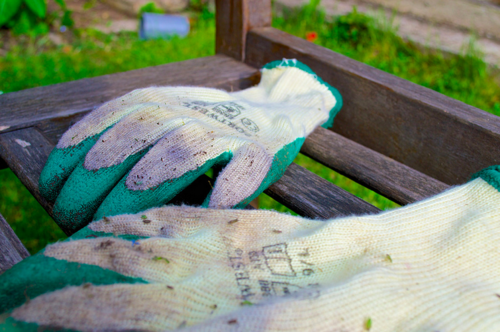
Gardening gloves are gloves worn for the protection of your hands when doing garden and yard work. There are different kinds of gloves, depending on what your particular needs are. Gloves can keep your hands clean and, depending on their strength, may protect the hands from prickles, caustic substances, minor bites and sharp objects.
Gardening gloves can be purchased from hardware stores, garden centres and many stores that carry gardening lines.
In some cases, you may not be able to find the kind of gardening gloves that suit your needs. For example, few gardening gloves reach beyond the wrist area. For people who suffer from contact dermatitis caused by brushing against plant material, it may be necessary to sew on additional coverage that reaches to the elbow region.
Types of gardening gloves
- Cotton gloves: These are ideal for light garden work that does not involve contact with thorns or prickles. These gloves should not be worn when cutting prickly material or handling stems of roses and other thorny plant matter. Some cotton gloves are made with upper-side cotton and the lower-side (palm) made from rubber, leather or other material, to provide more durability and protection.
- Leather gloves: These gloves are usually preferred for heavy garden and yard work, and where thorns and prickles are likely to be an issue. Leather gloves tend to be uncomfortable in hot conditions and may not provide the dexterity required for certain manual tasks.
- Synthetic gloves: These range in quality and durability and may or may not be as useful as leather gloves. This will depend on the price and thickness/quality of the materials used. Dollar store gloves are rarely useful for anything beyond light gardening work and may only last one session, making them a poor investment choice and a wasteful resource use.
- Rubber or latex kitchen gloves: While these aren't usually of use in the garden, they may be useful in some instances, such as when removing small garden pests by hand from non-prickly plants.
Note
No gloves are a substitute for sensible and cautious handling and reaching actions. For example, if you are handling wood or cleaning a yard where snakes are known to reside, the glove will likely not protect you from bites if you place your hand where you cannot see what is inside the pile or object. Use sensible precautions in such instances and do not rely on the gloves to protect you.